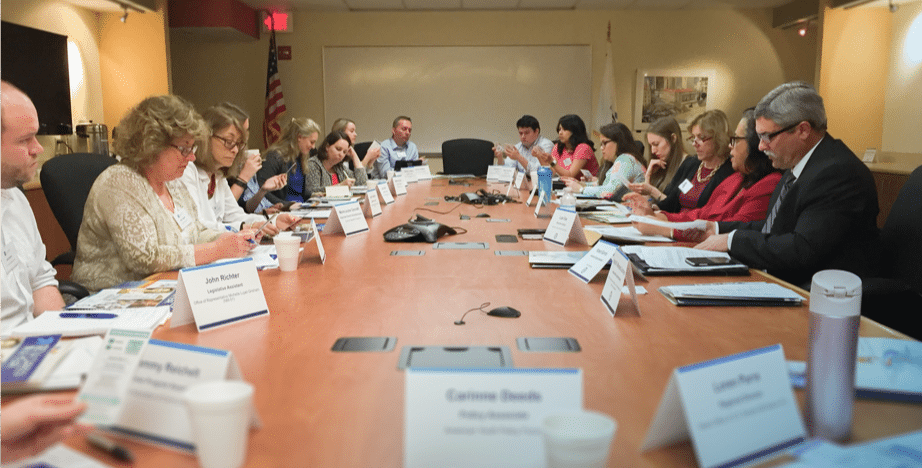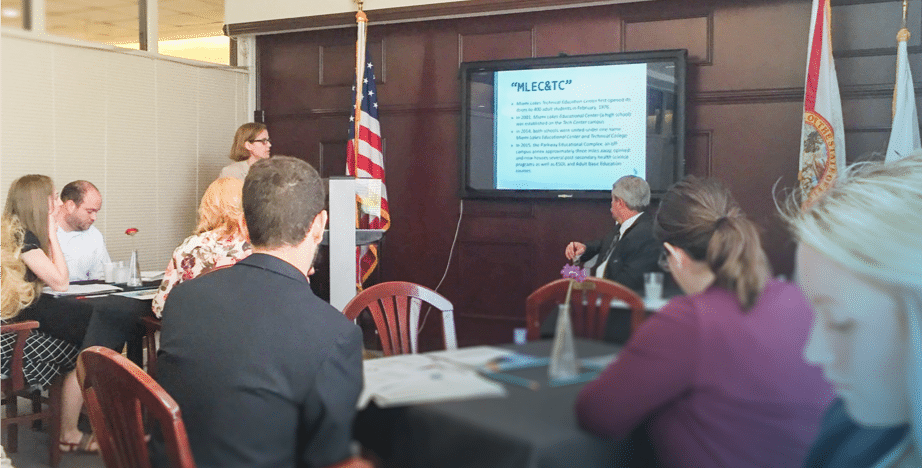Overview
This meeting provided participants with an opportunity to revisit and delve deeper into the main themes and questions raised by the previous three meetings in this year-long discussion group series. Participants discussed common policy barriers and supports for closing achievement gaps, policy considerations related to the reauthorization of ESEA, and identified possible areas for future collaboration among the participating groups. Attendees had an opportunity to describe how their organizations are working to close achievement gaps and address comprehensive factors that contribute to student success. The day’s conversations informed work on the development of a policy paper that will summarize the shared learning and outcomes of the discussion group and identify policy recommendations.
Resources from American Association of Community Colleges
Achieving the Dream: Community Colleges Count [SUPPORTS COMPLETION]
Contact: Lynn Barnett
Achieving the Dream (ATD) focuses on community college student achievement, with an emphasis on low-income students and students of color. It engages 160 colleges in 30 states and the District of Columbia and serves more than two million students. AACC manages the ATD National Database, data tools and annual Strategy Institute with 1,400 attendees, supports the Developmental Education Initiative, and serves on ATD’s Continuous Improvement and Innovation Council. See www.achievingthedream.org. (Launched in 2004 by Lumina Foundation for Education)
Advanced Technological Education (ATE) [SUPPORTS COMPLETION]
Contact: Ellen Hause
Since 1994, the ATE program has provided grants to improve and expand programs that prepare skilled technicians to work in high-tech fields that drive the U.S. economy. AACC hosts an annual ATE principal investigators conference, special topic conferences, and a mentoring program. Services include technical assistance; publications; referrals; and resources in the science, technology, engineering and mathematics (STEM) fields. See www.aacc.nche.edu/ateprogram. (Supported by the National Science Foundation)
Community Colleges Broadening Horizons through Service Learning [SUPPORTS COMPLETION]
Contact: Gail Robinson
Since 1994 “Horizons” has provided grants to member colleges seeking to integrate service learning across the curriculum through model programs and mentoring. AACC provides training, publications, and resources to all colleges interested in service learning and community engagement and conducts research on the impact of service learning on student learning outcomes, civic engagement, retention, persistence, and community partners. See www.aacc.nche.edu/servicelearning. (Supported by Learn and Serve America)
Make It Personal: College Completion (MIPCC) [SUPPORTS COMPLETION]
Contact: Gail Robinson
MIPCC is a three-year demonstration program to improve student retention and success by addressing pregnancy planning and prevention and healthy relationships. Five AACC member colleges received grants to create curriculum-based strategies, using service learning as a focus, to improve student retention and provide resources that students need to complete their college goals. Replicable course templates are available at www.aacc.nche.edu.edu/mipcc. (Supported by the National Campaign to Prevent Teen and Unplanned Pregnancy)
MentorLinks [SUPPORTS COMPLETION]
Contact: Ellen Hause
Launched in 1999, MentorLinks provides grants to community colleges seeking technical assistance, mentoring, and networking opportunities to improve undergraduate programs that prepare technicians in science, technology, engineering, and mathematics (STEM) fields. The 2011-2013 MentorLinks colleges, to be selected in spring 2011, will work with a community college mentor who has successfully planned and implemented a major change in a program in a high-technology field. See www.aacc.nche.edu/MentorLinks. (Supported by the National Science Foundation)
Minority Male Student Success Database [SUPPORTS COMPLETION]
Contact: Kevin Christian
Launched in January 2010, the Minority Male Student Success Database enables AACC member colleges to upload descriptive profiles of their programs that focus on minority male student recruitment, mentoring, persistence, and completion. The searchable database serves as a resource for member colleges interested in developing similar programs. See www.aacc.nche.edu/mmss.
Plus 50 Completion Strategy [SUPPORTS COMPLETION]
Contacts: Mary Sue Vickers and Norma Kent
Plus 50 Completion is a four-year effort to leverage and scale-up existing Plus 50 strategies to enable 20 community colleges to increase the number of plus 50 adults with no degree to pursue credentials (degrees, certificates, and not-for-credit credentials) in high-demand fields that meet local workforce needs. (Supported by Lumina Foundation for Education and The Atlantic Philanthropies)
Voluntary Framework of Accountability in Community Colleges (VFA) [SUPPORTS COMPLETION]
Contact: Kent Phillippe and Bernadette Farrelly
AACC and a group of community college leaders, in partnership with the Association of Community College Trustees and the College Board, are developing community college-appropriate measures of student progress/ outcomes and contributions to workforce, economic and community development. Draft data definitions have been created and are being pilot tested at 40 sites. Results of pilot testing will assess the colleges’ capacity to calculate metrics to benchmark student progress and completion data against peers and to provide critical information to stakeholders. See www.aacc.nche.edu/vfa. (Supported by the Bill & Melinda Gates Foundation and Lumina Foundation for Education)
Community College/Career Collaboration (C4) [SUPPORTS COMPLETION]
Contact: Jim McKenney
The Community College/Career Collaboration was launched in 2009 by Goodwill Industries International in partnership with AACC, the Aspen Institute, Jobs for the Future, and three pilot community colleges. The purpose is to increase college and career success for low-income adults by documenting, promoting, and replicating successful models throughout Goodwill and community college networks. (Supported by Goodwill Industries International)
Healthcare Virtual Career Network [SUPPORTS COMPLETION]
Contact: Jim McKenney
AACC will spearhead an effort with major workforce, healthcare, and government partners to provide web-based services to explore healthcare careers and employment and training options in the healthcare sector. Focused initially on healthcare, where significant shortages exist and for which community colleges play a lead training role, the platform will be a prototype for future industry sectors and a resource for colleges and their workforce and economic development counterparts. A soft launch of the platform is scheduled for April 2011. See www.aacc.nche.edu/hvcp. (Supported by the U.S. Department of Labor)
Kresge Building a Green Workforce: Charting a Course for Community Colleges [SUPPORTS COMPLETION]
Contact: Jim McKenney
A sustainability and green jobs agenda is being implemented with support from AACC’s Sustainability Task Force. The SEED (Sustainability Education and Economic Development) Center will be expanded to share online resources and solutions to help community colleges prepare a green workforce and build the new economy. See www.aacc.nche.edu/sustainable. (Supported by The Kresge Foundation)
Click here to see the final agenda for this meeting»
Click here to view the list of forum participants»
Additional Resources
- New NCLR Report: Plugged In: Positive Development Strategies for Disconnected Latino Youth
NCLR profiles a pilot program of the NCLR Escalera Program: Taking Steps to Success, which addresses the obstacles faced by young Hispanics who are disconnected from school and work.




